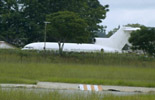
A report released this month by the Stockholm International Peace Research Institute (SIPRI) details the role of air cargo carriers in conflicts throughout Africa. From Darfur to eastern Congo and northern Uganda to eastern Chad, air transport is the method of choice for small arms traffickers. The European Union estimates that 80 percent of all small arms and light weapons (SALW) shipments are delivered by air.
In addition to bringing small arms in, these air cargo carriers transport goods and minerals out of conflict zones. In eastern Congo, for example, carriers are used to lift mass quantities of cassiterite (a mineral used in cell-phones) out of military-held mines. Each year, hundreds of millions of dollars worth of diamonds, gold, and coltan are flown out of Congo’s borders, increasing the incentive for armed groups to fight for control of the lucrative mines.
Ironically, the same cargo planes used to deliver destabilizing and illicit commodities throughout Africa also support peacekeeping operations and transport humanitarian aid. The SIPRI report found that U.N. agencies, NGOs, the EU, and NATO have used the same air cargo carriers that transport SALW and precious minerals to and from conflict zones. In Sudan, the U.N. peacekeeping missions have continued to use Badr Airlines despite the Security Council’s recommended ban in response to the airline’s violation of an arms embargo.
Dyncorps, a U.S. military and intelligence contractor, has contracted Aerolift despite a 2006 U.N. Security Council report that found the group had supplied illicit weapons to al-Shabaab, a jihadist group designated by the State Department as a Foreign Terrorist Organization. Dyncorps has also hired air cargo services to transport humanitarian aid and African peacekeepers.
The good news is that air cargo carriers are tracked and, therefore, are the only non-state actors in conflict zones that are forced to operate overtly. Furthermore, there are international standards and regulations already in place to prevent air cargo carriers from fueling conflict. However, despite regulations, air cargo carriers remain equal opportunists–both fueling wars and carrying out humanitarian missions. The devil now lies in the details and the political will of the international community to deny these carriers airspace and enforce their own rules.

